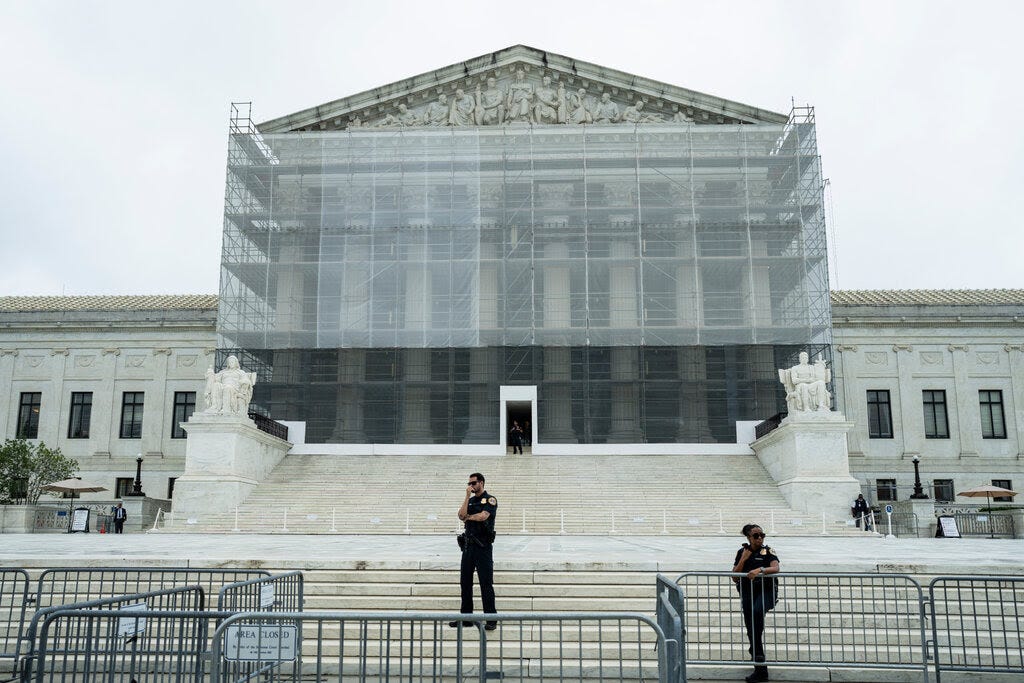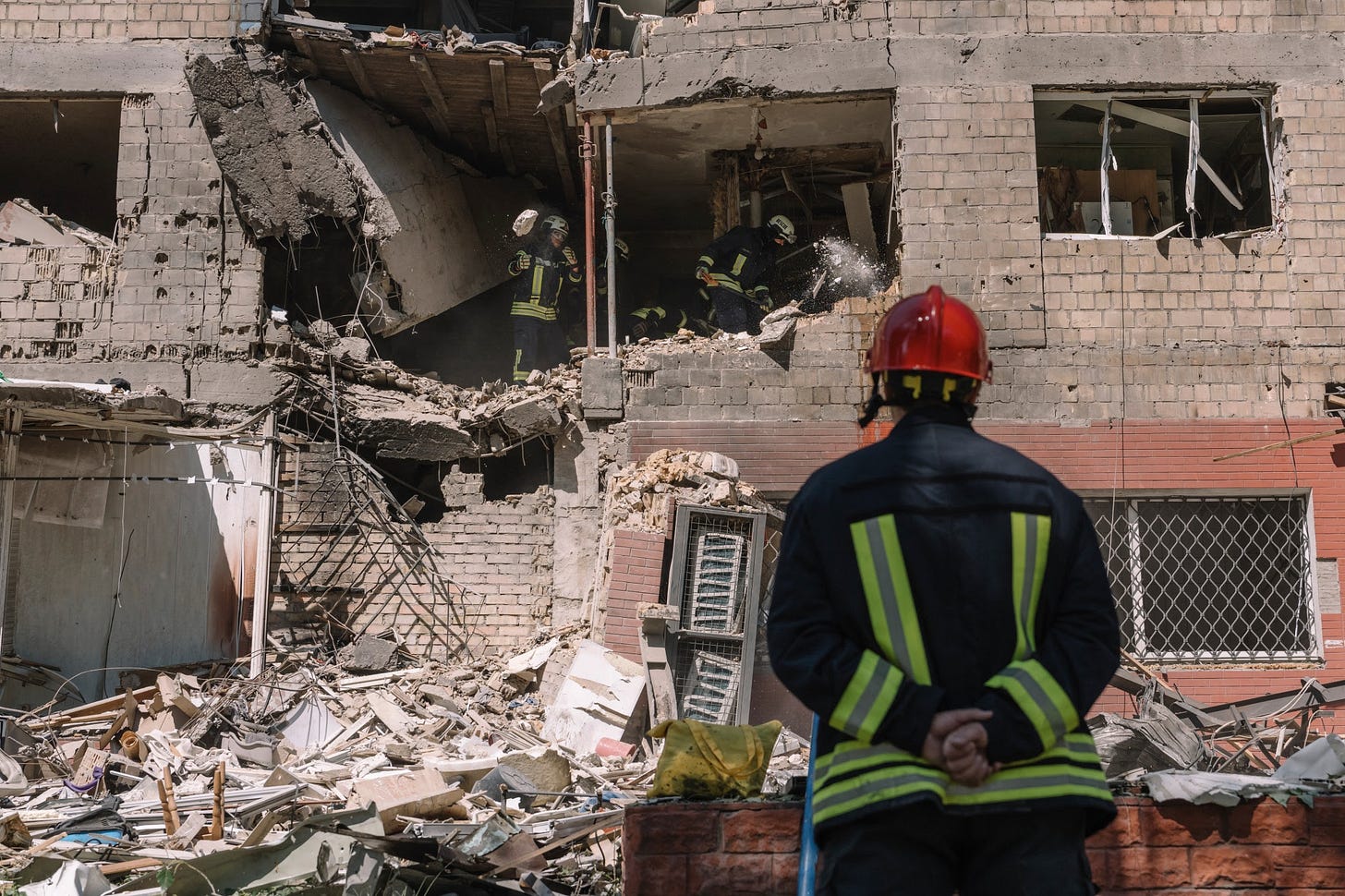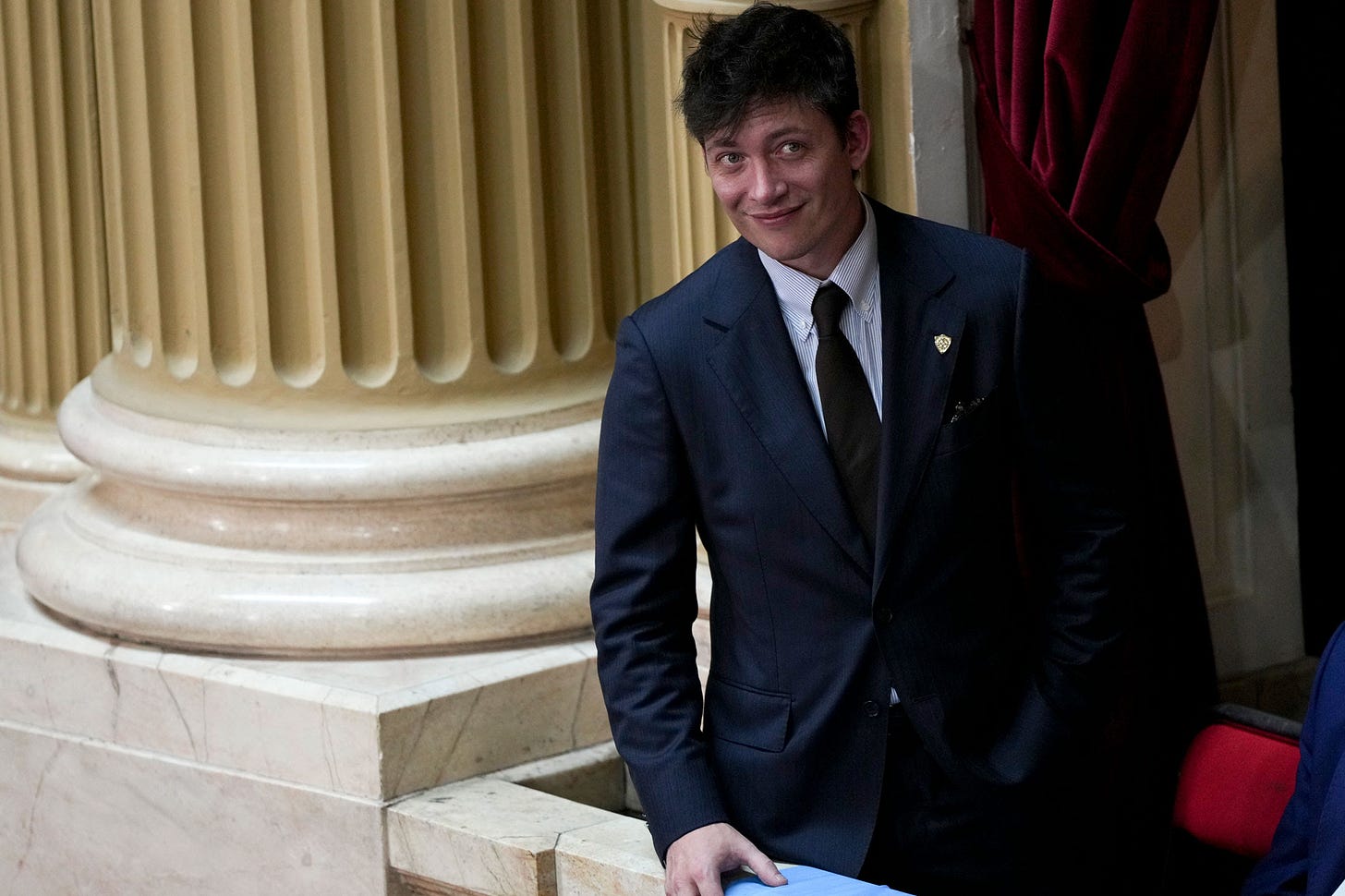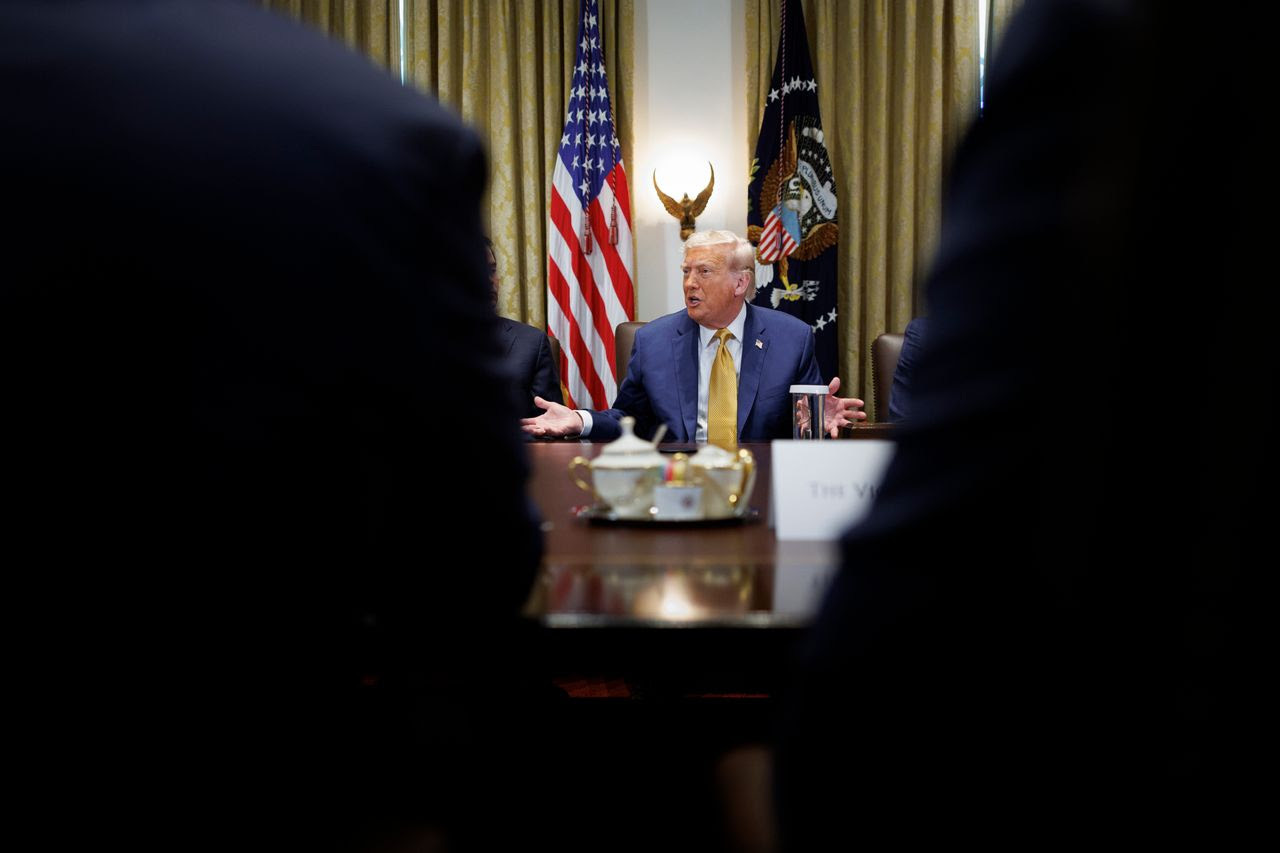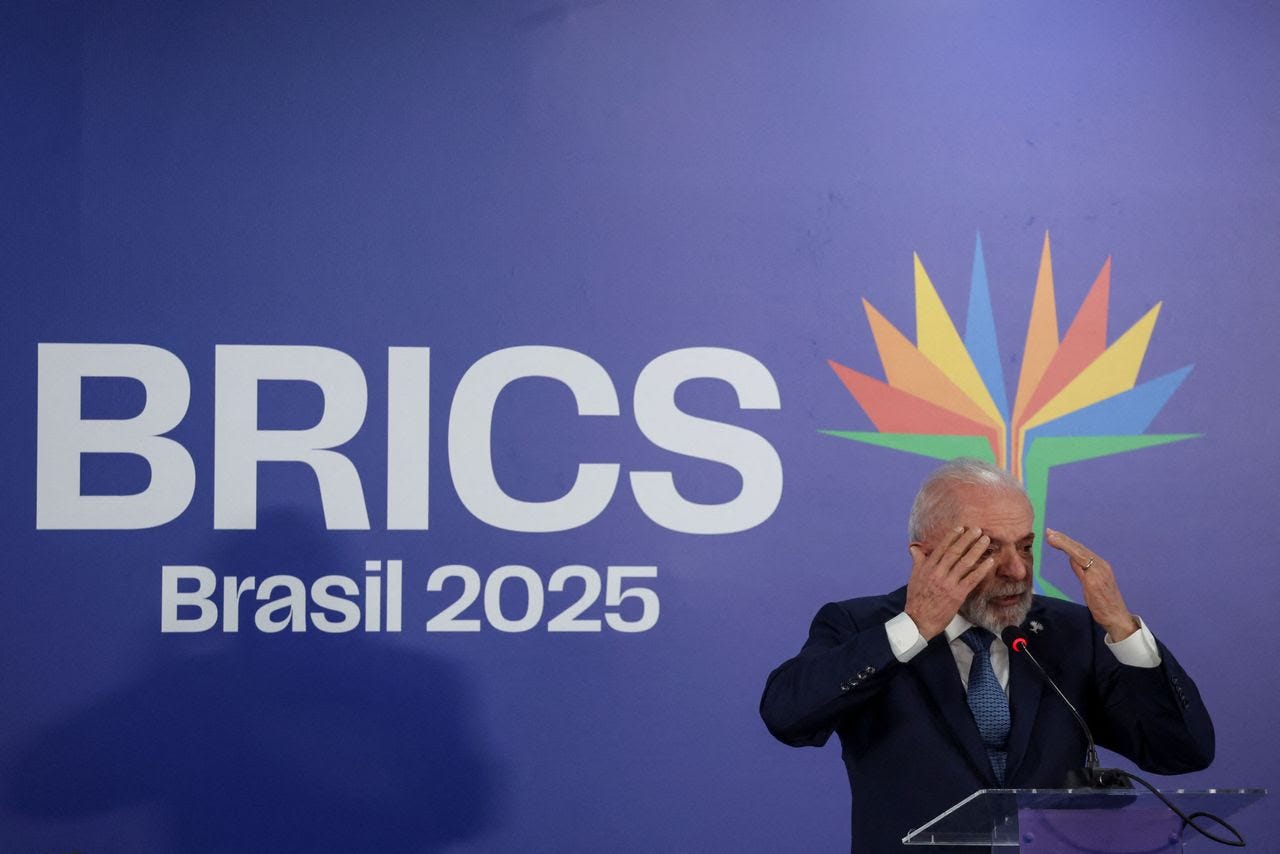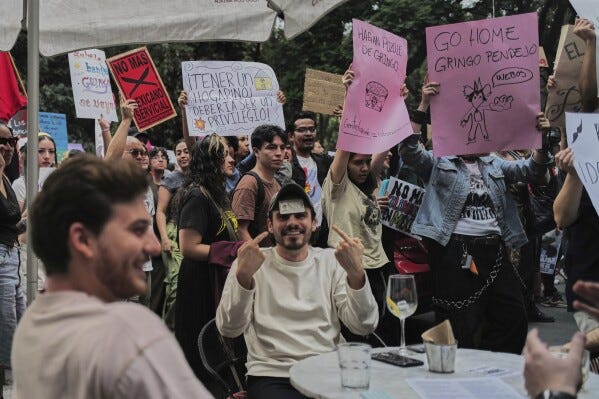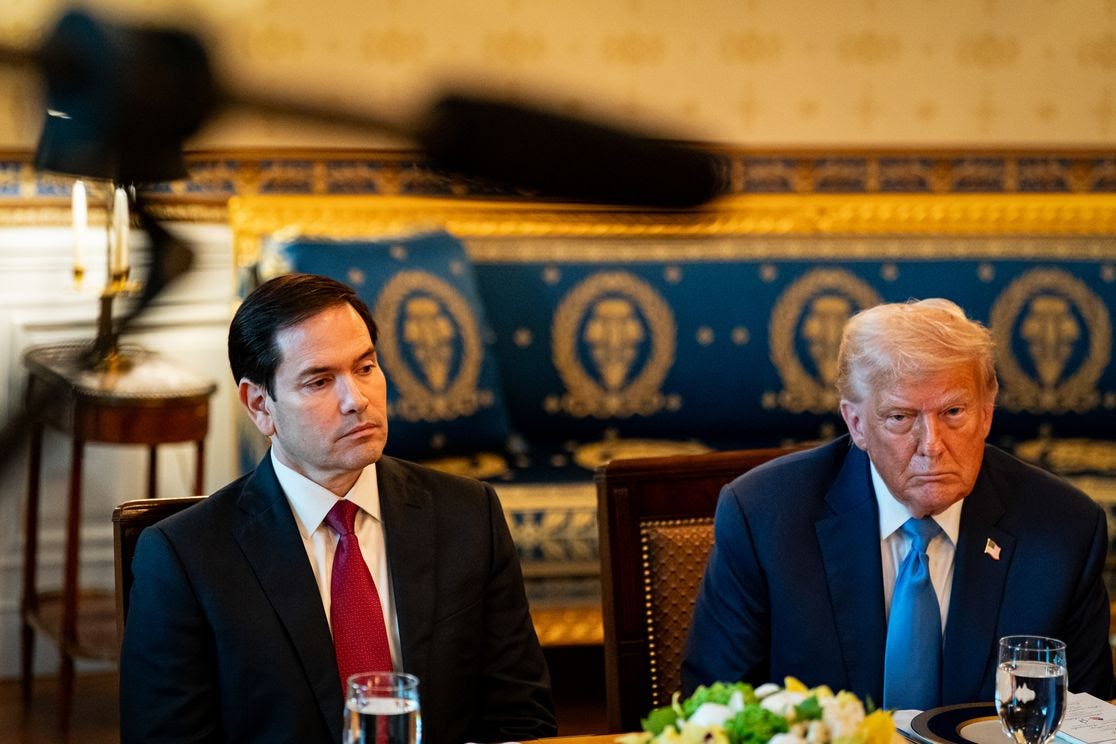Haiyun Jiang/The New York Times
Supreme Court green-lights Trump’s order for mass firings across federal government
“The Trump administration can move forward with plans to fire tens of thousands of workers across the federal government, the Supreme Court ruled Tuesday.
A judge in California had blocked the layoffs, finding that they would likely violate federal law. But the justices granted an emergency appeal from the administration seeking permission to enforce a Feb. 11 executive order that instructed agencies to carry out dramatic ‘reductions in force.’
In an apparent 8-1 ruling, the high court said it was not assessing the legality of any particular agency’s layoff plans, nor any moves taken so far to implement those plans. Litigation over the downsizing efforts is sure to continue. But for now, the justices said, the administration can enforce the executive order and a memo from the Office of Management and Budget implementing that EO.”
Read the latest at POLITICO
Loren Elliott for The New York Times
At Least 161 Still Missing in a Single Texas County, Governor Says
“The death toll has continued to rise every few hours, reaching at least 109 by the afternoon. Officials in hard-hit Kerr County acknowledged that no one there had been found alive since Friday.”
Follow live updates at New York Times
Minnesota state Sen. John Hoffman, shot 9 times by a man posing as an officer, leaves the hospital
“Minnesota state Sen. John Hoffman, who was shot nine times by a gunman posing as a police officer who authorities say went on to kill another lawmaker, is out of the hospital and is now recovering in a transitional care unit, his family said.” Read More at AP News
ICE accused of detaining Latino citizens
Illustration: Lindsey Bailey/Axios
“A growing number of U.S. citizens — many of them Latinos — are reporting they were detained for various periods by immigration agents in what critics say were instances of racial profiling and overzealous policing, Axios' Russell Contreras writes.
Why it matters: U.S. citizens aren't supposed to be arrested or detained unless agents allege they're breaking laws. But reports of citizens of Latino descent being detained — or stopped and asked to prove citizenship — are rippling through Latino communities nationwide.
ICE hasn't released statistics on such detentions in months. Tricia McLaughlin, a Department of Homeland Security spokesperson, told Axios that recent reports of citizens wrongly being arrested are false — and that ‘the media is shamefully peddling a false narrative’ to demonize ICE agents.
But an Axios review of news reports, social media videos and claims by advocacy groups about raids since President Trump took office found several instances in which U.S. citizens alleged they were wrongfully detained — in one case, for 10 days in immigration detention.
Zoom in: In May, ICE briefly detained Florida-born Leonardo Garcia Venegas from his job at a construction site in Foley, Ala. Agents alleged that Garcia's Real ID was fake, according to Noticias Telemundo.
Immigration officials held U.S. citizen and Albuquerque resident Jose Hermosillo for 10 days in Arizona's Florence Correctional Center after arresting him, and didn't believe him when he said he was a citizen, Arizona Public Media reports.
Last month, ICE briefly detained U.S. citizen Elzon Lemus, an electrician from Brentwood, N.Y., during a traffic stop after agents told Lemus he ‘looked like’ someone they were looking for, CBS News reported.” [Axios]
Ten people were charged in connection with a July Fourth shooting of a police officer at a Department of Homeland Security detention center in Texas.
“Prosecutors called it an organized attack with AR-15-style rifles and said anti-ICE graffiti was found near or at the scene, warning of the dangers immigration officials face. The 10 face three counts of attempted murder and three counts of discharging a firearm during a crime of violence. No lawyer for them was listed in court records.” [Wall Street Journal]
New York City real-estate executives are throwing money behind incumbent Mayor Eric Adams to counter Zohran Mamdani’s rise.
“Mamdani, the Democratic candidate, campaigned on a rent freeze to help solve the city’s housing crisis. Adams, who was elected as a Democrat, is running for his newly created ‘Safe&Affordable’ party. Developers pivoted from supporting former New York Gov. Andrew Cuomo after he lost the Democratic primary.” [Wall Street Journal]
INTERNATIONAL
“Russia unleashed another record air attack on Ukraine overnight, hours after Donald Trump voiced his frustration at Vladimir Putin’s refusal to end the war.
The episode encapsulated the challenge facing the US president after six months of trying to broker a deal: Trump keeps asking for peace, while Putin continues waging war.
WATCH: Trump uses an expletive to describe Putin’s actions.
The US has so far held back from punishing Moscow, arguing that the Russian president wouldn’t engage with diplomacy otherwise. Trump noted yesterday, though, that Putin’s ‘very nice all the time, but it turns out to be meaningless.’
He lifted a controversial US pause on sending defensive weapons to Ukraine and said he’s looking ‘very strongly’ at a Senate bill that threatens Russia with harsh new sanctions.
Ukraine and its European allies are left wondering if Trump is starting to pivot toward confronting Russia as the aggressor in the war. They watched the US’s attempts at rapprochement with Putin with mounting anxiety, fearful that Kyiv would be forced into a humiliating peace deal.
It’s unlikely Kremlin officials were surprised by the change of tone, after Putin made clear in last week’s phone call with Trump that Russia won’t back down on its war aims in Ukraine.
They may be counting on the mercurial Trump changing his mind again. Or calculating that the US won’t do anything to prevent Russia grinding out its advance on the battlefield.
That’s even as Trump showed in Iran that he’s capable of ordering a sudden and decisive application of US military power to tilt the outcome of a conflict.
Trump entered office pledging to end the war in Ukraine quickly. He has now identified Putin as the obstacle to achieving that goal.
For Ukraine and Europe, the question is whether he’ll follow through, or whether Putin turns out to be the better judge of Trump. “— Anthony Halpin [Bloomberg]
Rescue workers at the site of a Russian air strike on a residential building in Kyiv on Friday. Photographer: Andrew Kravchenko/Bloomberg
“Taiwan is preparing to kick off its most expansive annual military drills ever — underscoring President Lai Ching-te’s drive to protect the self-run democracy from Chinese assertiveness. The exercises will last 10 days, double the usual number, more than 20,000 reservists are being called up and local governments will test their ability to maintain essential services and distribute supplies in a crisis.” [Bloomberg]
Taiwanese reservists participate in training today. Photographer: I-Hwa Cheng/AFP/Getty Images
“China hit back at European Commission President Ursula von der Leyen after she accused the nation of distorting trade and limiting access for Europe’s firms — a back-and-forth clouding the outlook for an upcoming summit. Beijing has imposed export controls on rare-earth magnets, while the European Union has slapped tariffs on electric-vehicle imports and excluded Chinese firms from public contracts for medical devices, sparking retaliation. Separately, China challenged Germany’s accusation that one if its warships behaved dangerously toward a plane in the Red Sea.” [Bloomberg]
“Trump said Jerome Powell should ‘resign immediately’ if allegations from an administration official that the Federal Reserve chair misled lawmakers prove true, while deepening his personal attacks against the head of the US central bank over interest-rate policy. In a social-media post, Trump accused Powell of ‘whining like a baby about non-existent Inflation for months, and refusing to do the right thing.’” [Bloomberg]
“On the rare occasions Santiago Caputo is spotted in public, he’s often lighting up a cigarette in his signature Ray-Bans, adding to the allure of the 39-year-old, who was a nobody outside of niche political circles until relatively recently but has risen to become Argentine President Javier Milei’s top strategist. Read our profile here of the man described as the ‘hottest ticket’ for meeting requests from hedge-fund executives and institutional investors.” [Bloomberg]
Santiago Caputo. Photographer: Rodrigo Abd/AP Photo
“The Philippines said its visiting-forces agreement with Canada is ready for signing and is negotiating a similar pact with France as it builds a coalition of like-minded countries amid tensions with China.” [Bloomberg]
“French President Emmanuel Macron urged the UK to recognize the state of Palestine in an address to the British parliament that emphasized the need for cooperation amid uncertainty over US support.” [Bloomberg]
“Trump said South Korea should pay more for its own defense, upping pressure on the Asian ally after he sent a letter to extend time for negotiations before 25% across-the-board levies kick in for its exports to the US.” [Bloomberg]
“Spanish Prime Minister Pedro Sánchez announced a slew of anti-corruption measures as he seeks to overcome a graft scandal involving two close collaborators that has rocked his government.” [Bloomberg]
WorldView
By Ishaan Tharoor with Rachel Pannett
In expanding trade war, Trump digs U.S. into a geopolitical hole
President Donald Trump reacts during a Cabinet meeting Tuesday at the White House. (Tom Brenner/For The Washington Post)
“On Monday, the White House launched new salvos in its widening trade wars. President Donald Trump threatened to impose tariffs of between 25 percent and 40 percent on imports from 14 countries, including Japan, South Korea, Thailand and Bangladesh, unless they address his concerns over perceived bilateral trade imbalances.
The renewed tariff threats went down like a lead balloon in capitals across the world, including among some of the U.S.'s closest allies. Japanese Prime Minister Shigeru Ishiba described the developments as ‘deeply regrettable.’
His colleague, Itsunori Onodera, policy chief for Japan’s ruling Liberal Democratic Party, said Trump’s decision ‘to notify a key ally with nothing more than a single letter is extremely disrespectful, and I feel a strong sense of indignation.’ Secretary of State Marco Rubio’s decision to drop stops this week in Tokyo and Seoul during a quick Asia trip underscored the fresh tensions.
Various governments fitfully tried to hash out new understandings with the Trump administration to stave off the threatened tariffs. South African President Cyril Ramaphosa said that the 30 percent tariff Trump sought to impose on his country as a ‘reciprocal’ was ‘not an accurate representation of available trade data.’ Thailand’s acting prime minister, Phumtham Wechayachai, bemoaned the ‘contradiction’ as Trump’s latest edict seemed to undo the progress made amid trade talks just last week.
Brazil's President Luiz Inácio Lula da Silva speaks to the media Monday at the BRICS Summit in Rio de Janeiro. (Ricardo Moraes/Reuters)
Over the weekend, Trump also lashed out at the BRICS grouping of non-Western powers, threatening its 10 members and other partner states with additional tariffs because of the bloc being supposedly ‘anti-American.’ Brazilian President Luiz Inácio Lula da Silva, who was hosting a BRICS leaders’ summit in Rio de Janeiro, rebuffed Trump’s bullying. ‘The world has changed. We don’t want an emperor,’ Lula said, adding: ‘This is a set of countries that wants to find another way of organizing the world from the economic perspective. I think that’s why the BRICS are making people uncomfortable.’
Trump had threatened 100 percent tariffs on the BRICS countries — which include putative Washington adversaries in Russia, China, and Iran, but also close partners such as India — if the bloc pursued attempts to break the global influence of the U.S. dollar. Some members had offered vague proposals for a new common currency to undercut dollar dominance, but the project has not got off the ground amid frictions within the bloc and wariness of courting Washington’s wrath. Nonetheless, Celso Amorim, Lula’s chief foreign policy adviser, said Trump’s new threat ‘reinforces the willingness of [BRICS] members and associated partners to chart our path and seek greater independence.’
That’s a calculation other U.S. allies are making as well. On a visit to Britain, French President Emmanuel Macron warned of Europe’s overreliance on the United States and China. ‘If we want to build a sustainable future for all children [we have] to de-risk our economies and our societies from these dual dependencies,’ he said. France wants ‘an open world,’ Macron added, gesturing to the ‘strategic autonomy’ for the continent that he has long championed. ‘We want to cooperate, but not to depend.’
The frustrations and concerns being aired by world leaders are borne out by public sentiment. A Pew poll published Tuesday found that a significant proportion of citizens of U.S. allies see Trump’s America in a gloomy light. Majorities in Canada and Mexico view their neighbor as the ‘greatest threat’ facing their country, marking significant increases since a similarly worded survey in 2019. Further afield, more than a third of South Africans, 40 percent of Indonesians, 30 percent of all Turks, and almost a fifth of respondents in Japan — a treaty ally protected by U.S. forces — also singled the United States out for the singular threat it posed.
Trump and his allies cast their trade wars as a necessary effort to restructure global trade and bring more manufacturing home. Whatever the merits of their case, analysts see their approach as potentially damaging to the geopolitical interests of the United States. ‘The president is determined to light a fire under those trading partners who he thinks are not moving fast enough,’ Wendy Cutler, vice president of the Asia Society Policy Institute and a former U.S. trade negotiator, told my colleagues. ‘But to hit two of our closest allies [Japan and South Korea] with high tariffs — particularly when we have benefited from cooperation with them on semiconductors and energy and chip building, and when their companies invest a lot in the United States — it is hard for me to circle the square here.’
‘Many in Asia are going to ask, ‘Is this how the U.S. treats its friends?’ Manu Bhaskaran, chief executive of Centennial Asia Advisors, a research firm, told the New York Times. ‘Will there be permanent damage to American standing and interests in Asia and elsewhere through these crude threats and unpleasant language?’
Oliver Stuenkel, an associate professor of international relations at the Getulio Vargas Foundation in São Paulo, suggested Trump’s broadsides against the BRICS as a bloc shook up a rather sleepy summit that various heads of state, including the Russian and Chinese presidents, had chosen to skip. The bloc had put out a careful joint statement that expressed disapproval of Israel’s conduct of the war in Gaza and concern over the strikes on Iran, but did not call out U.S. involvement in either instance.” [Washington Post]
“Deadly protests in Kenya. At least 11 people were killed and more than 500 people arrested during anti-government protests across Kenya, the country’s National Police Service said on Monday. The demonstrations marked the 35th anniversary of Kenya’s Saba Saba rally, which launched the country’s push for multiparty democracy in 1990, and followed deadly protests that began last year over Kenyan President William Ruto’s controversial tax reform.
Though the Kenyan government withdrew its tax bill last June, the death of Albert Ojwang, a Kenyan teacher and blogger who died in police custody in Nairobi last month, has sparked renewed outrage over government corruption and police brutality as well as broader grievances such as the country’s spiraling debt problem and rising costs. The state-run commission on human rights has accused the police of using excessive force as well as collaborating with ‘armed criminal gangs’ in Nairobi and other cities to quell protests.
‘Even in Kenya—which has a good democratic tradition, political stability, and impressive economic growth—people we spoke to described how too many of the country’s resources are lost, stolen, or wasted by corrupt or incompetent government officials,’ U.S. Sen. Chris Murphy wrote in Foreign Policy last year.” [Foreign Policy]
Mexico's president calls march against mass tourism 'xenophobic.' Critics blame government failures
“A fierce protest in Mexico City railing against gentrification and mass tourism was fueled by government failures and active promotion to attract digital nomads, according to experts, who said tension had been mounting for years. The criticism comes after Mexico's president alleged that Friday’s protest was marked by xenophobia, reviving a debate over an influx of Americans in the city.” Read More at AP News
BUSINESS
Workers and wages
“President Donald Trump’s megabill is now a megalaw with wide-reaching implications for many Americans. He says it will boost the economy and put more money in people’s pockets, especially for hourly workers — but the outcomes aren’t always that cut and dry.” [CNN]
Tariffs squeeze profit margins
Data: KPMG. Chart: Axios Visuals
“A survey out today finds many companies are already feeling tariff pain, Axios' Ben Berkowitz writes.
Why it matters: Businesses can only eat trade costs for so long before raising prices, fueling the tariff-driven inflation many economists fear.
57% of companies were already experiencing a tariff-driven decline in gross margins as of May, according to a KPMG Tariff Pulse Survey of executives at 300 companies with annual revenue of $1 billion or more.
A quarter of respondents said their margins had already fallen by 6% or more.
Zoom in: If higher prices haven't shown up for customers yet, the survey makes clear they're coming.
77% of respondents said their companies are considering price increases of at least 5% in the next six months.” [Axios]
Copper is a crucial component of electrical wiring, motors and many consumer goods.
PHOTO: NIKI CHAN WYLIE/BLOOMBERG NEWS
U.S. copper prices soared to a new all-time high after President Trump said Washington will hit imports of the metal with a 50% tariff.
“Futures contracts jumped 13% in the largest single-day price surge ( read for free) in records going back to 1968, according to Dow Jones Market Data. Meanwhile, Trump said he’d hold firm on his latest trade-deal deadline, Aug. 1. The president also discussed tariffs of up to 200% on pharmaceuticals and said he might send a letter to the EU within two days threatening to impose steep tariffs on the bloc if it doesn't reach a trade deal with the U.S. Trump yesterday sent similar letters to 14 countries, mostly in Asia.” [Wall Street Journal]
TECH
Rubio's AI impersonator
Secretary of State Marco Rubio sits next to President Trump during a dinner with Israeli Prime Minister Benjamin Netanyahu on Monday. Photo: Al Drago/Bloomberg via Getty Images
“Secretary of State Marco Rubio's voice was mimicked in a string of artificial-intelligence-powered impersonation attempts, The Washington Post first reported (gift link).
Why it matters: Threats from bad actors harnessing voice-cloning technology are rapidly expanding beyond typical ‘grandparent scams’ to target or impersonate high-profile government officials, Axios' Avery Lotz and Sam Sabin write.
State of play: U.S. authorities don't know who is behind the campaign, in which an imposter claiming to be Rubio reportedly contacted three foreign ministers, a member of Congress and a governor.
The scam used a Signal account with the display name ‘marco.rubio@state.gov.’
The hoax follows a May FBI warning about a text and voice messaging campaign to impersonate senior U.S. officials.” [Axios]
Musk's Grok praises Hitler
Photo illustration: Aïda Amer/Axios. Photo: Jim Watson/AFP via Getty Images
“Elon Musk's AI platform Grok faced backlash yesterday for repeatedly using antisemitic language in its replies on X, Axios' Herb Scribner and Scott Rosenberg write.
The big picture: Grok's posts featured violent depictions of sexual assault, as well as praise for Adolf Hitler (more than once) and white nationalist Nick Fuentes.
Musk said on Friday that the company had ‘improved Grok significantly’ — his latest attempt to retrain it to answer prompts more to his liking.
Instructions for the chatbot, published by xAI, said that its responses ‘should not shy away from making claims which are politically incorrect.’ Those instructions were removed last night.
Zoom out: Grok will no doubt keep getting tweaks and revisions that might mitigate its most outrageous posts, but the larger problem is one Musk has intentionally chosen to create.
After purchasing Twitter, now X, he changed policies to tolerate a wide range of extremist views, including open avowals of Nazi allegiance and other forms of hate speech.
Then Musk trained his new AI model, Grok, on X's content. The resulting chatbot is just reflecting X's atmosphere back at us.” [Axios]
Underwater turbine spinning for 6 years off Scotland's coast is a breakthrough for tidal energy
“Submerged in about 40 meters (44 yards) of water off Scotland’s coast, a turbine has been spinning for more than six years to harness the power of ocean tides for electricity — a durability mark that demonstrates the technology’s commercial viability.” Read More at AP News
HEALTH AND MEDICINE
Cuts and chaos
“The Trump administration’s broadsides against scientific research have caused unprecedented upheaval at the National Cancer Institute. There has been an exodus of clinicians, scientists and other staffers. Some were fired, and others are leaving in exasperation.” [CNN]
‘No safe amount’
“Nutrition experts say there’s strong evidence against eating processed meat based on a new study about the connection between diet and the risk of major diseases. Researchers also found elevated danger from consuming soda and trans fatty acids.” [CNN]
CULTURE
The Bayeux Tapestry will be displayed in the UK for the first time in nearly 1,000 years
“The Bayeux Tapestry depicting the conquest of England will be displayed in the U.K. for the first time in almost 1,000 years. Officials said Tuesday that the treasured medieval tapestry will be on loan from France and arrive next year at the British Museum, where it will star in a blockbuster exhibition from September 2026 to July 2027.” Read More at AP News
Ancient ruins
“Archaeologists unveiled a Peruvian city that was a thriving hub of trade more than 3,000 years ago. The site — now open for tourism — includes a modern interpretation center, reception areas and walking routes through the preserved ruins.” [CNN]




